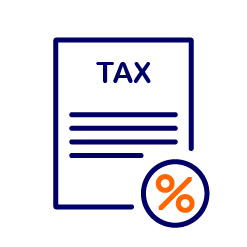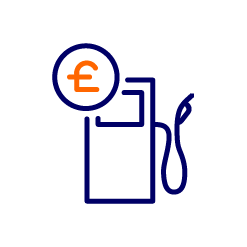Van Leasing and Tax Benefits
When it comes to Van Leasing, the tax benefits vary depending on whether you are an employee, an employer or a sole trader.
From Benefit-in-Kind tax (BIK) to reclaiming VAT, these benefits are explained in more detail here, on HMRC's website here, or you can call Nationwide Vehicle Contracts on 0345 811 9595 to speak to one of our experienced leasing consultants.
But here are some of the more salient points that you will need to know when it comes to Van Leasing and Tax Benefits.
Benefit-in-kind (BIK)
Also known as Company van tax when it comes to Commercial vehicles, BIK tax is levied against any perks or benefits you receive from your employer in addition to your salary - and that includes any use of company vans for personal use. (BIK is also levied when using company cars too.)
Benefit-in-Kind (BIK)

When does BIK apply?
BIK only comes into play if you use the van for any private journeys, and any business journeys (i.e. any journeys to a temporary workplace or as part of the job such as attending appointments) are exempt from the tax, along with occasional private journeys. But regular school runs, weekend shopping trips and other such use count as private journeys and are subject to BIK tax.

Keeping records
The company has a legal duty to tell the taxman of this private use, so keep a mileage record of all journeys in the van, both work and private, to prove how and when the van was used and whenever the cost of private-use fuel was reimbursed

BIK van tax rate
The good news when it comes to BIK van tax is that the rate is set by the HMRC, whichever van, pick-up truck or light commercial vehicle (LCV) you drive, is set at £3,170. This means that, if you are a 20% tax ratepayer, the amount of company van tax you will pay is an annual figure of £634 (20% x £3,170) or £52.84 a month.

What doesn't qualify
Work buses and minibuses are not classed as vans because they are designed to carry people. Double-cab pickups also may or may not qualify, depending on various criteria.

Reducing the BIK rate
The standard BIK rate of £3,170 can be reduced if you can’t use the van for more than 30 days in a row or if you pay for your fuel to privately use the van, and if the van is a pool van where others use it, the BIK is shared between everyone who uses it.

BIK rates and private mileage
There is also a fixed BIK rate for any private mileage fuel paid for by the company, if this is the case, set at £598, and costing £119.60 a year for 20% taxpayers, regardless of how much fuel the company supplies

Electric vans and BIK rates
Electric vans have a lower BIK bill at the moment, but are estimated to rise next year, and rates for four-door, four seat double cab pick-up trucks depend on payload - so get that checked before using.

National insurance and reporting obligations
Like company car tax, the employer also has certain National Insurance and reporting obligations if they provide company vans and fuel to their employees, as they are liable to pay Class 1A National Insurance Contributions (NICs) on the value of the benefit which is based on the vehicle's P11D value and relevant BIK rate.
“Van leasing offers many tax benefits for businesses. VAT registered companies can claim back 100% of the VAT on vehicle payments and 100% of the VAT on maintenance costs. Company van drivers can also benefit from a very generous fixed Benefit-in-Kind rates for any private mileage fuel paid for by their company.”

Employer/ Business Owner Tax Benefits of Van Leasing
When it comes to Van Leasing, the tax benefits vary depending on the type of lease that you have taken the van on.
- When leased under a Contract Hire lease, all rental payments are treated as a tax-deductible expense in the profit and loss accounts, with any VAT reclaimable (subject to VAT criteria being met). The van is not capitalised in the balance sheet as the business is considered to be simply hiring a vehicle for a contracted period.
- If the lease is a Finance Lease, you will can offset any interest charged against the annual profits, with the van capitalised as a fixed asset. The annual depreciation charge plus any interest payable under the lease can be claimed as an allowable deduction for tax purposes.
- When leasing under a Contract purchase, a VAT registered company will not have to pay VAT on the monthly finance payments, although it is payable on the service costs of any optional service or maintenance package taken out.
- The amount of VAT that is reclaimable by a company or owner depends on how much of the vehicle’s mileage is driven for business (80% business mileage = 80% VAT reclamation).
As with all aspects of taxation, it is the responsibility of individuals and businesses to understand the rules and regulations and act accordingly. As personal and business circumstances can vary, it is advised that you take professional accounting advice if you are considering investing in a company van or pick-up truck.
Guide Information
Originally published: 25th June 2018
Last updated: 1st March 2023
